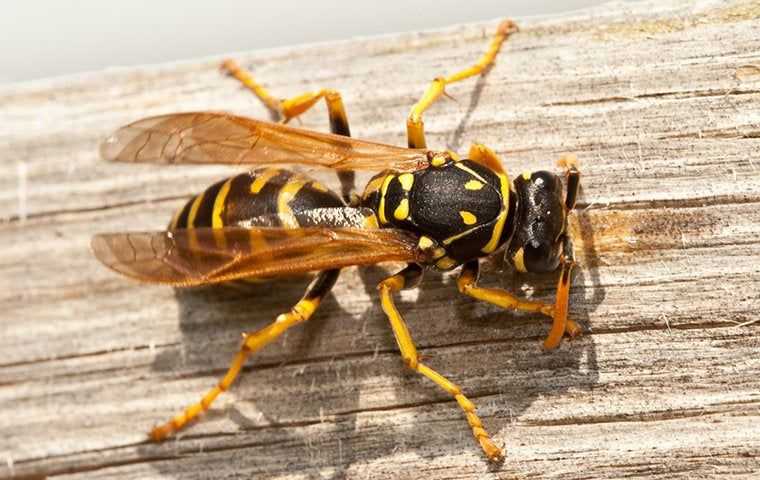
Stinging Insect Identification & Prevention
Get Started With Quality Pest Control
Stinging insects in Morristown are problematic and may cause serious health issues unless Trius Pest Management helps you defeat infestations of these pests.
What are stinging insects?
An insect that stings is commonly referred to as a stinging insect, and these pests are often unpleasant to deal with. Stinging insects can be aggressive, and despite their importance as pollinators, an infestation of stinging insects on your property brings serious problems with it.
In our area, there are a few different types of stinging insects that you should be cautious of, such as yellow jackets, wasps, ground bees, mud daubers, and European hornets. Yellow jackets have distinctive yellow and black patterns, while these other stinging insects may come in colors of yellow, red, black, blue, and brown. Contact Trius Pest Management for assistance with stinging insect identification.
Are stinging insects dangerous?
Insect bites and stings are dangerous to deal with thanks to the health issues that these pests bring with them. Not only are insect stings painful, but they may trigger allergic reactions. These allergic reactions may be serious with some individuals and result in anaphylaxis; any difficulty breathing or swallowing after an insect sting should be met with immediate medical attention.
It’s important to note that even individuals without preexisting allergy issues may have serious reactions to insect stings due to the nature of some of these pests to swarm their victims and sting them multiple times. Professional stinging insect control is the best way to combat these insects and avoid their dangers.
Why do I have a stinging insect problem?
If you are noticing an increase in stinging insects around your property, chances are that you have many of the factors that attract these pests on display. Stinging insects love bright, sweet-smelling flowers, unguarded trash cans, excess moisture, and pest prey such as spiders and ants, and an excess of these attractants on your property may result in a stinging insect infestation.
Where will I find stinging insects?
Stinging insects are typically found nesting outdoors high up in trees, around the eaves of garages, porches, and decks, or along the siding of buildings. They might also make their nests in the ground using abandoned holes or fallen trees and debris piles. Indoors, stinging insects typically create their nests in garages, attics, or the space between walls.
If you do come across a stinging insect on your property, it’s important to let the professionals handle it so you can avoid potentially dangerous stings.
Get rid of stinging insects that easy way by contacting Trius Pest Management at the first signs of these pests on your property. Our pest management professionals will help ensure all traces of these pests are removed and that your property is returned to safety from the dangers of stinging insects. With our help, you won’t need to dabble with DIY control solutions that leave you exposed to stings or future infestation problems.

Why Choose Trius Pest Management?
-
Personalized CareWe know our customers by name and we remember your preferences and account history in order to give you the best service possible.
-
Over 40 Years of ExperienceWith more than 40 years in business, you can feel confident that you're in the best hands possible.
-
Locally Owned & OperatedWe focus on nurturing personal relationships with our customers and care about providing you with the best experience possible.
-
Affordable TreatmentsWe offer payment plans and won’t tie you into a long-term contract or service agreement.
How can I prevent stinging insects in the future?
Prevent future stinging insect problems on your property by following our expert tips below:
- Replace sweet-smelling flowers on your property with plants stinging insects hate such as citronella, basil, and lemongrass.
- Remove piles of debris outdoors and cut back long grasses in addition to trimming overgrown trees to reduce stinging insect nesting spots.
- Address excess moisture issues on your property to stop humid and damp spaces from attracting stinging insects.
- Remove infestations of stinging insect pest prey with the assistance of Trius Pest Management.
- Cover up trash cans and clean food or drink spills promptly to stop the aroma from attracting stinging insects.
Don’t hesitate to reach out to Trius Pest Management for more information or assistance defeating stinging insects on your Morristown, NJ, property.

Hear From Our Happy Customers
At Trius Pest Management, your satisfaction is our priority! See for yourself what people have to say about working with us.
-
“We've called on Trius for a variety of issues for the past 5+ years.”- Brett S.
-
“Thorough, professional, and polite.”- Andy C.
-
“I have been using Trius for several years.”- Michele H.
-
“Highly recommended!”- Dvori P.
Trius Pest Management's Blog
Want all the latest news or updates? Browse through our blog to read our most recent posts and featured articles.


